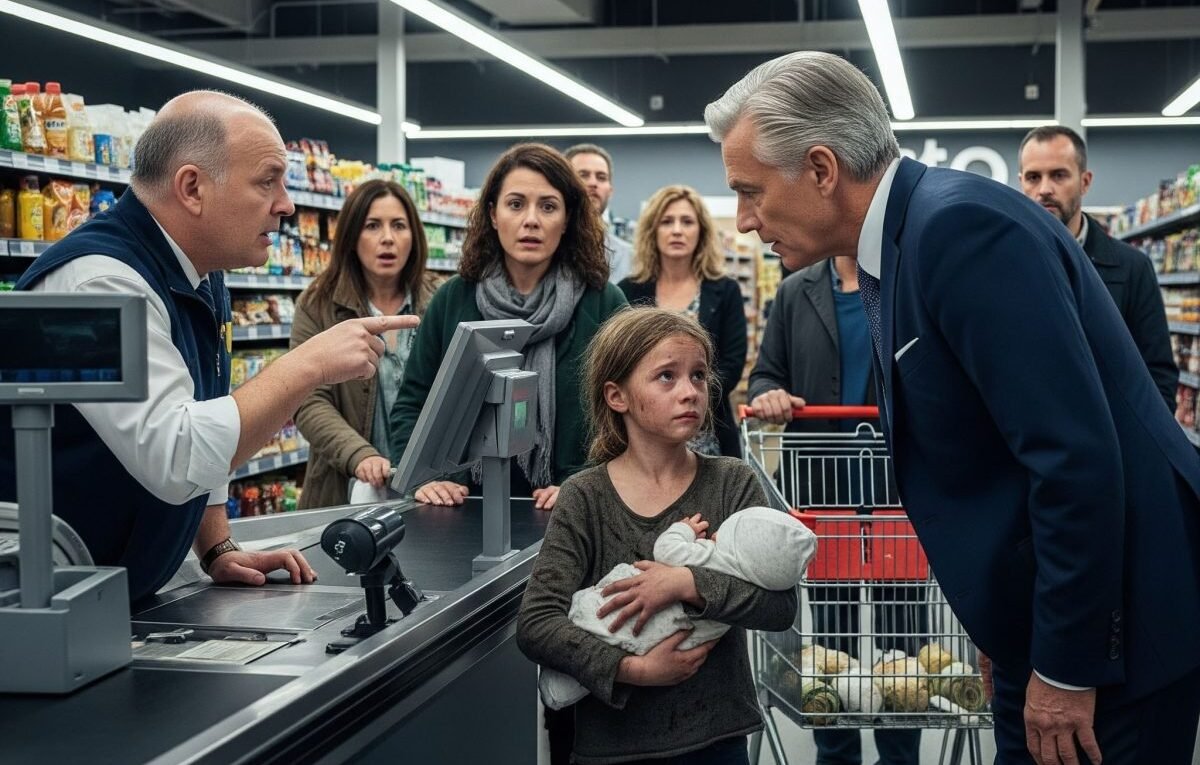Poor Girl Asks for a Carton of Milk with a Strange Promise – The Millionaire Looked at Her for a Moment and Then Did Something Unexpected
“I Swear I’ll Pay You Back”—A Nine-Year-Old Girl’s Plea Stunned a Billionaire and Sparked a Movement
The grocery store buzzed with the usual noise—metal carts clattering, barcode scanners beeping, the distant hum of conversation—until a stillness swept through the air like a dropped pin.
It started when a girl, no older than nine, stepped into the aisle with bare feet, tangled braids, and a baby on her hip. Her other arm clutched a single carton of milk, trembling slightly from the weight of both the child and the moment.
“I swear I’ll pay you back… when I grow up.”
Her voice was small but clear, and it landed like thunder.
The baby stirred in her arms, his whimper barely audible. Dirt smudged his cheeks. The girl’s shirt, faded and torn at the seams, hung from her thin shoulders like paper on a wire hanger.
The cashier blinked, thrown. “Hey! You can’t just walk out with that! Put it down or I’m calling security!”
Heads turned. Phones paused mid-scroll. One customer stopped mid-sip of a latte. The girl didn’t budge.
“I’m not stealing,” she said. “Just borrowing. I’ll pay you. One day.”
Behind the crowd, a man had just walked in. Tall. Silver-haired. Navy suit sharp enough to slice tension. His name was Grayson Maddox, billionaire tech mogul and owner of the store chain itself.
His eyes locked on the scene before him, and something ancient and painful flickered behind his calm expression.
“Are you alone?” he asked the girl softly.
She looked up. “Yes, sir.”
“Parents?”
She glanced at the floor. “Left. Said they’d be back… but they lied.”
The cashier snorted, muttering, “Probably some kind of scam—”
“Enough,” Grayson snapped, silencing the room.
He crouched slowly, so he was eye level with the girl. “What’s your name?”
“Keisha.”
“And the baby?”
“My brother. Malachi.”
A long silence followed. Grayson looked at the milk, then back at her.
“I just need it for him,” Keisha whispered. “He hasn’t eaten in two days. I didn’t know where else to go.”
Grayson stood and pulled out his wallet, thick with bills. He reached out.
But Keisha didn’t take the money. She stepped back.
“I don’t need cash, mister. Just the milk. That’s all.”
And it broke something in him.
“No,” he said firmly. “You need more than milk.”
Without hesitation, he scooped up the carton, tucked his wallet away, and turned to the stunned cashier.
“She’s coming with me.”
“What? You can’t just—”
“I own this store,” Grayson said, his voice like steel. “Call the police, call the press—call God if you want. She’s not going back out there alone.”
Keisha blinked. “Why would you help me?”
He met her gaze. “Because I was you… once.”
Keisha had never ridden in a car like that before. The black SUV purred like a tiger in sleep. She clutched Malachi to her chest while city lights passed like ghosts outside the window.
Grayson made phone calls—calm, commanding. A pediatrician summoned. A lawyer prepped guardianship papers. A chef began warming formula and cooking something called quinoa.
But what stunned Keisha most wasn’t the luxury.
It was the quiet.
The safety.
That night, after Malachi was bathed, fed, and fast asleep in a crib the size of a small boat, Grayson returned to check on her.
“I found the shelter you came from,” he said. “They said you vanished.”
“They were gonna split us up,” Keisha whispered. “Said we’d be safer. But he’s all I got.”
Grayson nodded. Then: “Earlier, you promised you’d pay me back. Remember that?”
Keisha nodded.
“Well… I’m holding you to it.”
She frowned. “You mean money?”
“No,” he said, sitting down. “I want something more valuable.”
She tilted her head.
“I want you to grow up. Stay in school. Learn. Build a life. Use that spark I saw when you walked into that store and bargained with me like a Fortune 500 CEO.”
“You think I’m smart?”
“I think you’re rare.”
Keisha had no words. She’d heard plenty of labels before—“burden,” “nuisance,” “problem”—but never rare.
Then, Grayson’s voice grew softer.
“When I was eight,” he said, “my mom disappeared. Left me on a porch and never came back. I bounced through shelters and foster homes. Nobody looked twice. I promised myself: if I ever made it, I’d turn around and lift someone else up.”
He looked at her, eyes glassy.
“You’re my promise.”
The next morning, headlines broke the internet:
“Girl Asks Billionaire for Milk—He Gives Her a New Life.”
But Grayson didn’t stop there. He launched The Promise Foundation, starting with food programs, then shelter projects, and eventually a scholarship fund—for children like Keisha.
As cameras rolled, the media buzzed. But Keisha stayed out of the spotlight, hidden in the safety of a real home, slowly learning to trust it wasn’t temporary.
Years passed.
One spring morning, in a glass-walled conference room above the city skyline, a confident young woman stood at the podium in a sleek blazer.
“Today,” she said, her voice unwavering, “we open the tenth Promise Center in the country.”
Grayson sat in the front row, older now, but shining with pride.
When asked what inspired it all, Keisha smiled and said:
“Because someone once believed in me. All I promised was to grow up. He gave me the chance to keep that promise—and I intend to pass it on.”
